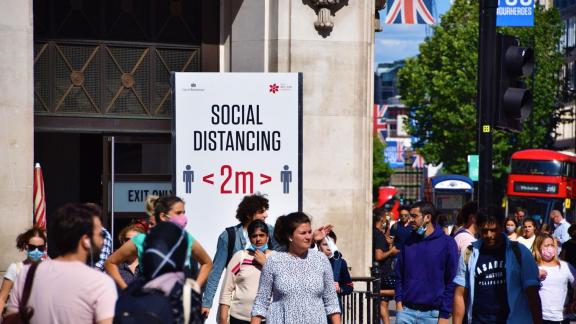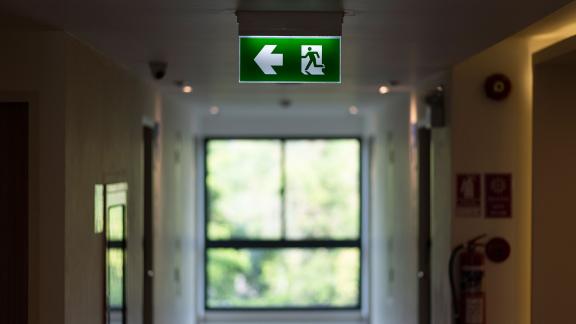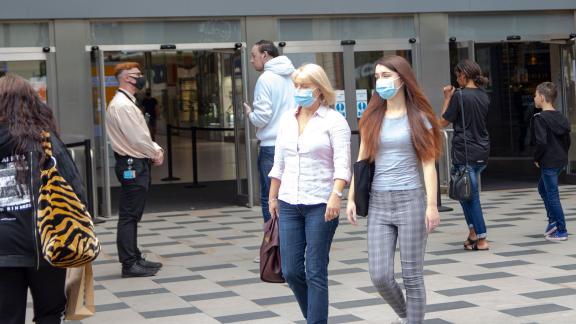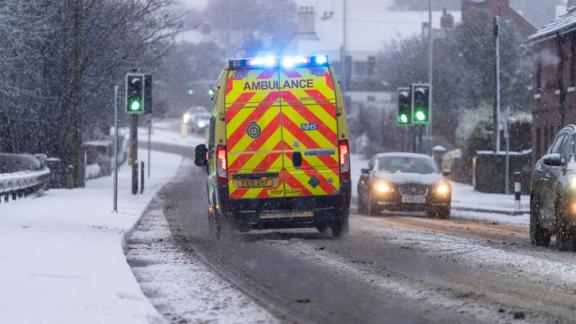Why the government should wait to lift lockdown restrictions

NHS leaders are concerned about the risks that lifting lockdown restrictions prematurely could have on the NHS’s ability to cope at a time when staff are working so hard to recover.
Key points
- On Monday 14 June the government is expected to announce whether it will remove the last of the COVID-19 restrictions in England on 21 June. If the government were to go ahead with the final stage of lifting restrictions, it would result in the removal of all legal limits on social contact.
- The decision on whether to fully unlock or bring about a short extension to the current restrictions is finely balanced. The government is weighing up the impact on the health and wellbeing of the population as well as the health of the economy, with the growing threat from the spread of the Delta variant.
- There is growing concern among health leaders given the recent rise in infections. It is estimated that there have been nearly 30,000 new UK cases of the Delta variant in the past week. This accounts for around nine in ten COVID-19 cases. This week’s test and trace data showed the highest weekly number of new COVID-19 infections since the end of March. The Delta variant is proving to be much more transmissible than the Alpha variant.
- To inform the debate this weekend (12/13 June) ahead of the government’s expected announcement, the NHS Confederation, the membership organisation for the whole healthcare system in England, Wales and Northern Ireland, has surveyed NHS leaders to seek their view on whether the restrictions should be lifted or maintained.
- This is far from a clear-cut issue and healthcare leaders are very aware of the damaging effects that prolonged social restrictions could have on the nation’s physical health and mental wellbeing. However, the majority of NHS leaders in England who responded to our survey – almost two-thirds – believe the government should not push ahead with ending lockdown restrictions and social distancing on 21 June. There was widespread support for this view across all parts of the health service and across all regions of the country.
- NHS leaders who responded to our survey are concerned about the risks that lifting prematurely could have on the NHS’s ability to cope at a time when staff are working so hard to recover. Our message to the Prime Minister is therefore: if there is any doubt about lifting the final restrictions on 21 June, then it is better to take action now and introduce a short delay to the plan to fully unlock. This will help ensure the NHS can vaccinate further parts of the population, offer more second jabs, and understand the threat from the Delta variant more clearly.
Introduction
Several data sources this week threw into question the viability of ending social distancing as planned on 21 June, given the potential impact this decision will have on NHS services, staff and the general public.
Worryingly, this week’s test and trace data showed the highest weekly number of new COVID-19 infections since the end of March. This is largely attributable to the Delta variant (first identified in India), which is found to be 60 per cent more transmissible than the Alpha variant (first identified in Kent) and more able to surpass vaccine protection.
Healthcare leaders are all too aware that rising infections, and especially at such a rapid rate, can easily lead to major rises in hospital admissions as well as impacts across the whole system, from ambulance services to primary care and community care.
There have already been reports of high bed occupancy rates among acute trusts. More people who have COVID-19 impact on the capacity of the NHS, which could hamper efforts to reduce the backlog of treatment that has built up during the pandemic. The latest NHS performance figures report an elective care backlog of 5.1 million people. Relatively small numbers of additional COVID-19 cases can have disproportionate effects on hospital capacity and therefore delay the recovery.
Ahead of the government’s decision on whether to remove all legal limits on social contact as planned on 21 June, we conducted a survey of leaders from all parts of the health service to understand their views on this issue. In total, 276 leaders from acute, mental health, community and ambulance service trusts; primary care networks and primary care federations; integrated care systems; and clinical commissioning groups (CCGs) responded to the survey. The survey was open from Tuesday 8 June to Thursday 10 June.
Findings
Overall, almost two-thirds (63 per cent) of NHS leaders favour a cautious approach and say that the government should pause plans to re-open on 21 June. Only 30 per cent are in favour of lifting the remaining restrictions.
As infection numbers rise and hospital admissions begin to increase again after months of decline, a majority in nearly all parts of our membership recommend a pause on reopening. This is a particular concern for our primary care, community care, mental health and CCG members, who were most likely to want to delay the lifting of restrictions.
“[We] need more progress on vaccinating 20/30s before further relaxation of current restrictions to prevent increased spread.” Acute Provider, North West
“Wait one month until more second doses have been administered. The NHS needs time to recover.” Clinical Commissioner, London
A majority of members in every region of England also want to see a delay to the restrictions being lifted.
Almost three-quarters (74 per cent) of NHS leaders in the South East want a delay, perhaps reflecting concerns about the Delta variant from members who most felt the impact of the Alpha variant over the winter.
Rates of ‘no’ were similarly high in the North West, a region currently battling high infection numbers resulting from the Delta variant, especially among those yet to be fully vaccinated.
"While understanding the economic effects, lifting all restrictions gives the public the message that the pandemic is over. Control of transmission still needs to remain.” Primary Care Provider, East of England
A consistent point that came through in comments from those who responded to the survey is that a short extension of the current restrictions is the right approach to buy the NHS more time to vaccinate the whole adult population. Many felt that we have come this far and that a small additional delay would be worthwhile.
“There’s a high risk of new variants emerging, rendering the vaccine campaign ineffective until all adults received two vaccines.” Primary Care Lead, North West
“Delay until greater clarity on the spread of the Indian [Delta] variant is available.” Primary Care Lead, South East
Some NHS leaders who are in favour of lifting restrictions on 21 June highlighted the wider implications on society, including from the mental health and wellbeing impact on local communities. This concern was also felt by those leaders who want to see the restrictions maintained for a short period.
“As long as we don't see increased hospitalisation of people who are infected, we need to press on with getting back to normal and achieving herd immunity.” Primary Care Provider, Midlands
“Hospitals [aren’t] not over-run. Population won't tolerate delay.” Primary Care Provider, South West
NHS Confederation viewpoint
This is far from a clear-cut issue and the situation is finely balanced. Healthcare leaders are very aware of the damaging effects that prolonged social restrictions could have on the nation’s physical health and mental wellbeing.
However, the majority of NHS leaders in England who responded to our survey believe the government should not push ahead with ending lockdown restrictions and social distancing on 21 June. There was widespread support for this view across all parts of the health service and across all regions of the country.
We welcome the government’s continued commitment to ensure its decisions on whether or not to lift the final restrictions are informed by data and clear evidence.
If it continues to follow this path, then we believe that the government should take a slow and cautious approach, constantly reviewing the data and paying close attention to how the Delta variant, which is now the dominant variant in the UK, continues to spread.
NHS leaders who responded to our survey are concerned about the risks that lifting prematurely could have on the NHS’s ability to cope at a time when staff are working so hard to recover. They are also concerned about the impact this could have on their efforts to reduce the backlog of care that has built up.
NHS staff are working flat out to address the elective backlog, as demonstrated by the recent NHS performance stats, which showed operations and other elective activity were restored to 90 per cent of pre-pandemic levels, well ahead of the 75 per cent threshold set out in the operational planning guidance. Ending lockdown restrictions pre-emptively could jeopardise these important efforts.
Our message to the Prime Minister is therefore: if there is any doubt about lifting the final restrictions on 21 June, then it is better to take action now and introduce a short delay to the plan to fully unlock. This will help ensure the NHS can fully vaccinate more of the population and at least offer some protection to younger cohorts. Crucially, it will also enable us to understand the threat from the Delta variant more clearly and to continue with the mammoth task of dealing with the treatment backlog.



